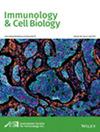2024年的亮点。用抗体-药物偶联物扩大抗癌免疫治疗方式:来自临床研究的新见解。
IF 3
4区 医学
Q3 CELL BIOLOGY
引用次数: 0
摘要
在这篇“2024年亮点”系列文章中,我们讨论了抗体-药物偶联物(adc),这是一种新兴的靶向癌症治疗方法,利用单克隆抗体的特异性将细胞毒性药物直接递送到肿瘤细胞。adc与肿瘤相关抗原结合,通过受体介导的内吞作用内化,并在细胞内释放其细胞毒性载荷,降低全身毒性。这种高度选择性的机制导致了肿瘤学的重大进步,提高了治疗效果,同时最大限度地减少了不良反应。本文章由计算机程序翻译,如有差异,请以英文原文为准。

Highlights of 2024. Broadening anti-cancer immunotherapy modalities with antibody–drug conjugates: emerging insights from clinical studies
In this article for the “Highlights of 2024” series, we discuss antibody–drug conjugates (ADCs), which are an emerging class of targeted cancer therapies that harness the specificity of monoclonal antibodies to deliver cytotoxic agents directly to tumor cells. ADCs bind to tumor-associated antigens, undergo internalization via receptor-mediated endocytosis, and release their cytotoxic payload intracellularly, reducing systemic toxicity. This highly selective mechanism has led to significant advancements in oncology, improving treatment efficacy while minimizing adverse effects.
求助全文
通过发布文献求助,成功后即可免费获取论文全文。
去求助
来源期刊

Immunology & Cell Biology
医学-免疫学
CiteScore
7.50
自引率
2.50%
发文量
98
审稿时长
4-8 weeks
期刊介绍:
The Australasian Society for Immunology Incorporated (ASI) was created by the amalgamation in 1991 of the Australian Society for Immunology, formed in 1970, and the New Zealand Society for Immunology, formed in 1975. The aim of the Society is to encourage and support the discipline of immunology in the Australasian region. It is a broadly based Society, embracing clinical and experimental, cellular and molecular immunology in humans and animals. The Society provides a network for the exchange of information and for collaboration within Australia, New Zealand and overseas. ASI members have been prominent in advancing biological and medical research worldwide. We seek to encourage the study of immunology in Australia and New Zealand and are active in introducing young scientists to the discipline.
 求助内容:
求助内容: 应助结果提醒方式:
应助结果提醒方式:


